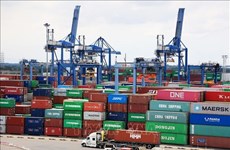Sharp rise in unofficial exports of pigs to China
Higher pork prices in China along an increase in the value of Chinese
yuan have led to an increase in the unofficial export of live pigs from
Viet Nam to the neighbouring country.
Higher pork prices in China along an increase in the value of Chinese
yuan have led to an increase in the unofficial export of live pigs from
Viet Nam to the neighbouring country.
Nguyen Minh Cuong, head of the Mong Cai Animal Quarantine Station, said in recent months, about 40-50 trucks transported pigs to a place near the Mong Cai Border Gate everyday. These were then taken to China by boats.
About 500 tonnes of pig were unofficially exported to China a day, he said.
"It appears that pigs are not only bought from northern provinces , but also from the south, including HCM City , Binh Duong and Dong Thap provinces," he added.
Truck owners as well as pig traders had found several ways to take their pigs across the border, and it was difficult for concerned agencies to prevent them, he added.
According to experts from the Ministry of Agriculture and Rural Development (MARD), the new practice was in direct contrast to the previous years, when there used to be a massive influx of pork and live pigs from China into Viet Nam in the later months of the year.
Chinese traders have been increasingly buying pigs from Viet Nam , especially those weighing between 80-120 kilos each.
There are different views on the increase in export of pigs to China . While some fear that it will cause a shortage of pork in the domestic market for the upcoming Tet (Lunar New Year) festival, others have said it is a good opportunity for breeders to earn higher profits, creating a momentum for the local husbandry industry to develop further.
Hoang Kim Giao, head of the Animal Husbandry Department, said there were an estimated 27.3 million pigs nationwide by the end of 2010, yielding about three million tonnes of pork, an increase of more than 3 per cent over 2009.
Poultry output in 2010 also increased by nearly 100,000 tonnes to 615,000 tonnes. In addition, output of beef and buffalo in 2010 was 6 and 6.5 percent higher than that in 2009.
"Demand for meat of all kinds is expected to increase by 20 percent this Tet, and the animal husbandry industry can meet the demand. Therefore, there will be no shortage of meat before, during and after Tet," he said.
MARD deputy minister Diep Kinh Tan asked pig traders to reduce unofficial exports to China to ensure supply in the local market for the nation's largest holiday, saying that from now until Tet, which falls early February, pig traders should only export a total of 10,000 tonnes of live pigs.
The ministry would increase checks on import and export of meat products in the coming time, with a focus on ensuring sufficient local supply, he said./.
Nguyen Minh Cuong, head of the Mong Cai Animal Quarantine Station, said in recent months, about 40-50 trucks transported pigs to a place near the Mong Cai Border Gate everyday. These were then taken to China by boats.
About 500 tonnes of pig were unofficially exported to China a day, he said.
"It appears that pigs are not only bought from northern provinces , but also from the south, including HCM City , Binh Duong and Dong Thap provinces," he added.
Truck owners as well as pig traders had found several ways to take their pigs across the border, and it was difficult for concerned agencies to prevent them, he added.
According to experts from the Ministry of Agriculture and Rural Development (MARD), the new practice was in direct contrast to the previous years, when there used to be a massive influx of pork and live pigs from China into Viet Nam in the later months of the year.
Chinese traders have been increasingly buying pigs from Viet Nam , especially those weighing between 80-120 kilos each.
There are different views on the increase in export of pigs to China . While some fear that it will cause a shortage of pork in the domestic market for the upcoming Tet (Lunar New Year) festival, others have said it is a good opportunity for breeders to earn higher profits, creating a momentum for the local husbandry industry to develop further.
Hoang Kim Giao, head of the Animal Husbandry Department, said there were an estimated 27.3 million pigs nationwide by the end of 2010, yielding about three million tonnes of pork, an increase of more than 3 per cent over 2009.
Poultry output in 2010 also increased by nearly 100,000 tonnes to 615,000 tonnes. In addition, output of beef and buffalo in 2010 was 6 and 6.5 percent higher than that in 2009.
"Demand for meat of all kinds is expected to increase by 20 percent this Tet, and the animal husbandry industry can meet the demand. Therefore, there will be no shortage of meat before, during and after Tet," he said.
MARD deputy minister Diep Kinh Tan asked pig traders to reduce unofficial exports to China to ensure supply in the local market for the nation's largest holiday, saying that from now until Tet, which falls early February, pig traders should only export a total of 10,000 tonnes of live pigs.
The ministry would increase checks on import and export of meat products in the coming time, with a focus on ensuring sufficient local supply, he said./.













